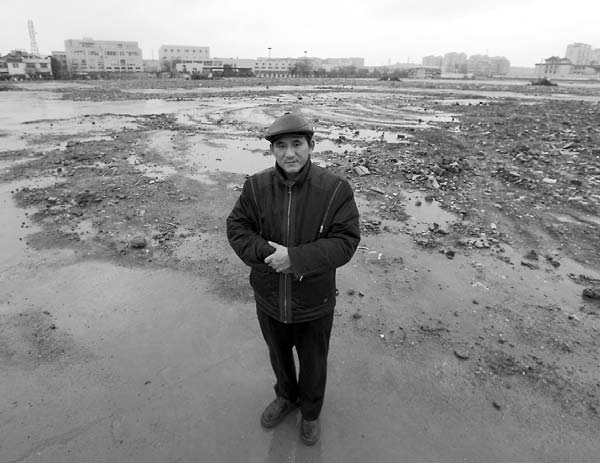Government and Policy
Relocation trauma could be reduced
By Cao Li (China Daily)
Updated: 2010-03-09 06:53
 |
Large Medium Small |
|
 |
|
Zhang Minsheng, 61, stands at the site of his demolished care home in Zhabei district, Shanghai. He received just 10 million yuan in compensation from the local authorities. |
|
||||
If there are no major disputes, governments above county level can approve the requisition, otherwise a higher authority will decide.
Most noticeably, the new rules strictly prohibit the use of violent measures by authorities or developers to force people out, such as cutting a resident's gas, water and heating supplies.
Wang Xixin, a Peking University professor, said the revised regulation will prevent disputes because developers will be made to agree to a fair price with homeowners before they bring in the bulldozers. "There is no real dingzihu in China. Most people are happy to move as long as they are well compensated," he said.
However, Wang Cailiang, a Beijing lawyer who has years of experience in home relocation disputes, said that plans to renovate old towns and improve living standards should not fall under the 'public interest' umbrella.
"They both involve commercial development. It is also ridiculous to include the construction of government offices as a public interest," he said, adding that the draft also failed to talk about the large amount of collectively- owned land in the Chinese countryside that is on the fast track to urbanization. Yu Jianrong, a researcher of the rural development institute under the Chinese Academy of Social Sciences, warned that local governments would never be "fair" when it came to relocation projects as long as they profit from property development and land sales.
Most local officials' top priority is healthy gross domestic product growth. Land sales not only make a massive contribution to GDP, they also generate fiscal income.
Land sales totaled 1.59 trillion yuan last year, a report by the China Index Academy showed, up more than 63 percent on 2008. Some cities, including Beijing, depend on such deals for almost 50 percent of their fiscal income, the report added.
Many local officials have joined developers in voicing strong opposition to the proposed changes to the law.
"I received a letter from a local government official after the draft was published who claimed the new regulations would halt economic development," said Shen Kui, one of the five professors who called for action after the death of Tang Fuzhen. "He wrote 'no increase in fiscal income, no city development'."
Pan Shiyi, a Beijing property tycoon, told 21st Century Business Herald that businesses in the property sector were concerned the revision would lead to a hike in the cost of development. "With less land available for development, the property price will inevitably rise," he warned.
Despite the division in opinion, however, Jiang at Peking University said the regulations was a big step forward. "No law can solve every problem and the relocation issue is one of the most complicated of all," he said.
Jiang and Wang have appealed for the revised law to be enforced soon, "otherwise more forced demolitions could be made in a rush", warned Wang.
One battle is still ongoing in Sanya, Hainan province, where more than 6,000 homeowners face relocation as officials strive to build the island into an international travel and shopping destination, Legal Evening News reported.
As the property price soars with investors rushing to the region, residents are allegedly being offered just one-tenth of the market price of their properties in compensation.
(China Daily 03/09/2010 page1)
 “It will be difficult to tackle property requisition with a regulation. To move the legal procedure forward, we will need the NPC to pass a law on it. We should not define public interest too strictly … otherwise it may not be able to meet the challenges brought by future development. More attention should be paid to the rules about compensating homeowners.”
“It will be difficult to tackle property requisition with a regulation. To move the legal procedure forward, we will need the NPC to pass a law on it. We should not define public interest too strictly … otherwise it may not be able to meet the challenges brought by future development. More attention should be paid to the rules about compensating homeowners.” “In the process of urbanization, we will have to face relocation. If any dispute comes up, all parties should resort to law. Some developers conduct illegal methods. Governments should push for relocation by law and stop developers’brutal demolitions.”
“In the process of urbanization, we will have to face relocation. If any dispute comes up, all parties should resort to law. Some developers conduct illegal methods. Governments should push for relocation by law and stop developers’brutal demolitions.” “Relocation involves three parties: Developers, homeowners and local authorities. Their relationship is clearly defined. We need to do more research before approving another law. Some governments consider investment the most important indicator of achievement and have participated in activities in relocations that have broken laws and Party rules.”
“Relocation involves three parties: Developers, homeowners and local authorities. Their relationship is clearly defined. We need to do more research before approving another law. Some governments consider investment the most important indicator of achievement and have participated in activities in relocations that have broken laws and Party rules.” “Before the new regulation is implemented, the central government should announce some principles that prevent rushed relocations being carried out (by local authorities).”
“Before the new regulation is implemented, the central government should announce some principles that prevent rushed relocations being carried out (by local authorities).”






